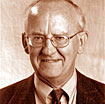Commentary on Proverbs 31:10-31
It was a retired Rabbi in our town who gave me an insight into Proverbs 31:10-31.
He was a congenial presence around the town and also at the college where I taught. In this case, he was visiting my freshman religion class and we were talking about Jewish wedding and wedded customs. He gave me an insight into Proverbs 31 that I’ve appreciated ever since. “Each Sabbath evening,” he told us, “I recite the poem in Proverbs 31 to my wife. It begins ‘A good wife who can find…’ and ends with the husband addressing his wife directly, in a ‘you’ statement:
Many women have done excellently,
But you surpass them all (verse 29).
This meant that once a week, after reciting an alphabet full of statements about your good wife, you look her in the eyes and switch to a “you” statement saying, in effect, “There are lots of great women around. But baby, you’re the best of them all!” When I have performed weddings, I have cited this text — and suggested that it would be a good practice for each married person to praise a spouse, at least once a week!
Where did these materials originate and function?
These short sayings (the bulk of the material in Proverbs 10-30) originated as folk wisdom. This wisdom was generated, preserved, and passed on in the spheres of the clan and the family.
After this material was collected and organized, it seems to have been used in some sort of school. Several hints point in this direction. When the young David arrived at the court of Saul, he was described as already educated — “skillful in playing, a man of valor, a warrior, prudent in speech, and a man of good presence; and the LORD is with him” (1 Samuel 16:18).
It appears that the material in Proverbs also functioned as a part of an educational program at the royal court. Biblical wisdom materials are associated with King Solomon (Proverbs 1:1; 10:1; 25:1). His empire required a huge staff just to keep it functioning. There was no doubt some sort of “internship” program for young people being prepared to take positions in Jerusalem. Hints throughout Proverbs suggest that the material functioned in such a way (Proverbs 23:1-3).
Interpretive issues
- Autobiographical stylization (Proverbs 24:30-34). Speakers often use this device to put themselves into a story: “A funny thing happened to me on the way to this meeting.” Note that the punch line in 33-34 must have been a saying which circulated independently, since it occurs in another setting (Proverbs 6:10-11). See also Psalm 37:25, 35-36 and Sirach 51:13-30.
- “Better x than y” statements. Some of these forms were likely invented just for the sheer delight of composing them, much as one might enjoy composing limericks. Examples include Proverbs 16:8,19; 17:1, 12; 21:19; 22:1; 25:7, 24; 27:10b; also Sirach 40:18-27.
- The instruction or imperative speeches in Proverbs 1-9 and 22:17-24:22 are dominated by the imperative mood, indicating that this material was designed to be used for providing instruction.
- Numerical sayings in the form x, x+1 were likely also composed for the sheer fun of it. See Proverbs 6:16-19; 30:15b-16, 18-19, 21-23, 24-28, 29-31.
- There are a few examples of riddles in biblical literature Again, the form is a playful one that lends itself to a pedagogical setting: See Proverbs 23:29 and note the answer in 23:30-35. See other examples of riddles in Judges 14:12-19 and 1 Kings 10:1. 1 Esdras 3 and 4 shows some royal bodyguards, on the job, passing the time with word games!
- The Alphabetical Acrostic Poem. Proverbs 31 contains an alphabetical acrostic. The writers of the Old Testament apparently liked making acrostics, following the sequence of letters in the Hebrew alphabet. Examples are Psalms 9, 10, 25, 34, 111, 112, 145, and (in a very high degree!) 119, when each letter of the Hebrew alphabet occurs in sequence eight times. One need only glance at Psalm 119 in the original Hebrew to see the acrostic arrangement. This of course is a device to aid in memorization. Testimony to its effectiveness is the fact that most persons of my generation can sing or recite from memory the words to the pop song, of the 40’s, “A, you’re adorable, B you’re so beautiful,” etc. Consideration of the alphabetical acrostic leads into today’s text.
The ABC’s of good wife (Proverbs 31:10-31)
Here is the Hebrew alphabet, starting with aleph in verse 10 and continuing through the last letter, tav, in verse 31.
The woman here described is in charge of managing the household. She gets up early and has prepared the tasks to be assigned to her staff (Proverbs 31:14-15). She deals in real estate (verse 16). Snow does not frighten her. She has prepared proper clothing to protect from the stormy weather. Her husband is a known and respected member of the community (verse 23). She has a well-tuned sense of humor, knowing when to laugh and when to be more reserved (verse 25). Finally, this good woman speaks words of wisdom, wisely (verse 26).
Note some of the characteristics of this woman: her value cannot be measured (verse 10) and she is totally supportive of her husband (verses 11-12). She is industrious, working into the night (verses 15, 18). She is concerned for the poor and the needy (verse 20) and of course, for her own family (verses 21-22, 27). She is a Godly woman, deserving of the praise of her children, her husband, and the community (verses 28-31).
To sum up: “Charm is deceitful and beauty is vain, but a woman who fears the Lord deserves to be praised” (verse 31).
One scholar described this portrait as “about as realistic as Snow White.” Preaching on this text will best follow the direction of the text itself, moving from speaking about the good wife (Proverbs 31:10-28, 30-31) to speaking to her (verse 29). She fears and praises the LORD; her works and her husband praise her. What could be better?
[Editor’s note: The author continues this series on Proverbs in the Semi-continuous First Readings for Sept. 16 and Sept. 9, 2018.]


September 23, 2018